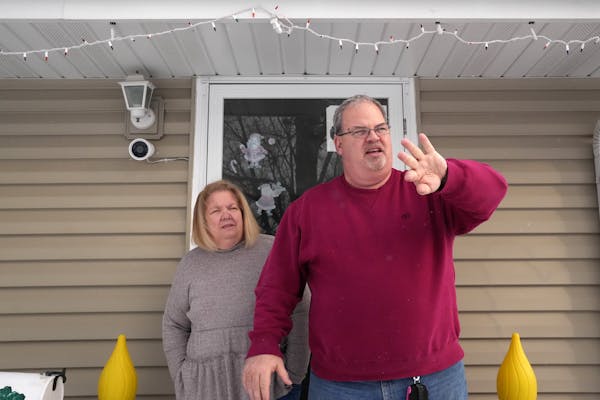Mayors, police chiefs and prosecutors across the Twin Cities are vowing to band together to slow a surge in violent crime that is roiling the region, but exactly how to do that remains unclear.
The group convened Monday to zero in on a recent rise in vehicle thefts and violent carjackings dozens of officials said requires better collaboration between cities and suburbs, as well as police and prosecutors.
"We can't incarcerate our way out of this problem," said Hennepin County Attorney Mike Freeman, who proposed reconstituting an 1990s-era crime prevention program that helped reduce violent crime in the "Murderapolis" era.
Yet friction soon emerged among the dozens of officials who packed a conference room in Eden Prairie. Some chiefs said that repeat offenders were the biggest problem, while prosecutors countered that they can only press charges in cases with sufficient evidence. Some mayors said residents and businesses in their communities are frustrated and eager for solutions as the crimes continue to confound authorities.
"We are here because our businesses and our residents tell us they are frightened and they want to know what we're going to do about it," said Maplewood Mayor Marylee Abrams.
Officials had such high interest in the meeting that the organizer, the Regional Council of Mayors, moved it to a larger location at Eden Prairie City Hall. Speakers included Freeman, Ramsey County Attorney John Choi, Minnesota Commissioner of Corrections Paul Schnell, Hennepin County Sheriff David Hutchinson and Minneapolis Mayor Jacob Frey.
Minneapolis police reported more than 600 attempted or successful carjackings in 2021. The crime spree has spilled into the suburbs, including Edina, St. Louis Park, Eden Prairie, Robbinsdale, Roseville, Maplewood and Woodbury.
"This is not suburban vs. urban. We are all in this together," said Eden Prairie Mayor Ron Case. "Eden Prairie does not exist if the core cities are not successful."
Choi and Frey both spoke of expanding programs that use a carrot-and-stick approach to support teens and young adults. Many officials also expressed support for law enforcement, who in recent weeks have openly criticized prosecutors for what they say is a failure to hold criminals accountable.
"We have to stop thinking that somehow the police are the problem. They are not. They are part of the solution, but for too long what we've been doing is we've been putting everything on the police," Choi said. "... What we really need to start doing is working together to understand the complexity of the problem."
But Maple Grove Police Chief Eric Werner, who is president of the Minnesota Chiefs of Police Association, said law enforcement jobs have only gotten more difficult as crime rises and the perception of police shifts.
"The bad guys see us as not having validity," Werner said.
A group of west metro mayors and police chiefs hosted a similar meeting Dec. 17 after a spate of violent suburban carjackings shocked residents in Edina and St. Louis Park.
"When one city experiences an increase in crime, it affects all of us," the mayors of Bloomington, Eden Prairie, Edina, Minnetonka and Plymouth said in a joint statement following the December meeting. "Together, we are committed to protecting our residents and preserving the high quality-of-life every person deserves."
Property crimes, particularly those targeting or involving automobiles and their parts, surged significantly in those cities and in nearby St. Louis Park. The six cities together experienced at least 550 catalytic converter thefts, and most saw incidents involving drivers fleeing in a motor vehicle more than double.
In the wake of a grocery store parking lot carjacking in Edina, the police department rolled out a voluntary program for residents to register home surveillance cameras in a database used in investigations. More than 100 homeowners registered within days.
The west metro mayors also vowed to strengthen partnerships with law enforcement and the Hennepin County Attorney's Office, which on Monday announced it will re-launch a public-private partnership called MN HEALS 2.0. Freeman said it's a "rebirth" of MN HEALS — Minnesota Hope, Education, and Law and Safety — initiated in 1997 to reduce violent crime.
The revamped partnership will focus on violent carjackings by juveniles, said Freeman, who announced Sept. 1 that he does not plan to seek re-election after more than 20 years in the post.
Freeman also promised to ramp up prosecution of carjackings.
"These are violent and scary cases for the victims who are carjacked, some happening in broad daylight outside the grocery store or their homes," he said in a news release.
Staff writers Jeff Hargarten and David Chanen contributed to this report.

Want to share info with the Star Tribune? How to do it securely

'Safe recovery sites' would offer syringes, naloxone and more to people using drugs. The plan could be in peril.
New Minnesota GOP leaders seek peace with party's anti-establishment wing

Who is Republican Lisa Demuth, Minnesota's first House speaker of color?

